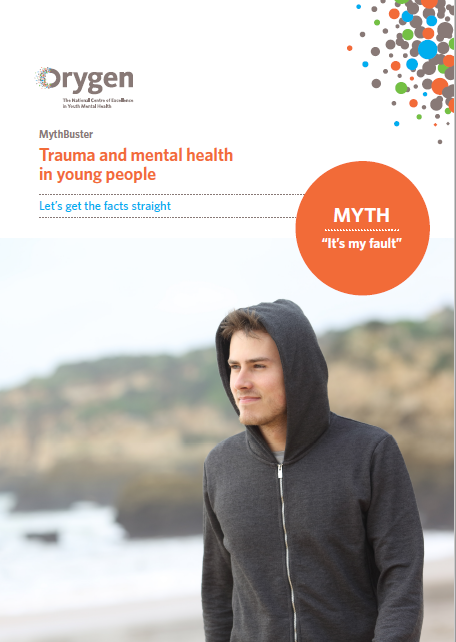
Orygen (the National Centre of Excellence in Youth Mental Health) have just released an excellent fact-sheet for young people explaining the links between trauma and mental health.
In the fact sheet Orygen look at some of the most common myths and misconceptions about the relationship between trauma and mental health. It is definitely worth a read.
In this post, I am just going to pull out a few messages from the fact sheet that I think are worth emphasizing. I should note, that whilst the fact sheet is focused on young people, the ideas contained within are relevant across all age ranges.

To start, we should define trauma.
Trauma is any “deeply distressing experience that can be emotionally, mentally or physically overwhelming for a person”. Examples of traumatic experiences include:
+ community violence (e.g. burglary, physical or sexual assault, bullying)
+ physical, sexual or psychological abuse
+ natural disasters (e.g. hurricane, flood, fire)
+ being in or witnessing a serious accident
+ sudden unexpected or violent death of someone close (e.g. suicide, accident)
+ serious injury (e.g. burns), major surgery (e.g. heart surgery) or life threatening illness
+ domestic or family violence
+ war or political violence
Trauma can be experienced as a single incident (e.g. assault, accident) or as repeated over time (e.g. child abuse).
For an event to be traumatic, it doesn’t necessarily have to happen directly to you. It might be something you witness, or hear about. It might be related to the experiences of generations before you (inter-generational trauma)
Trauma can happen to anyone.

People often misunderstand trauma and its relationship with our mental health. Some of these misunderstandings potentially leave people feeling guilty or ashamed about their experiences. That seems unfair to me, that someone struggling with either trauma or mental ill health should be feeling ashamed, so lets look at some true/false statements about trauma and mental ill health.
Everyone who has a mental illness, has a trauma history
Nope. Not true. Mental illness can be caused by a lot of factors, including genetics and medical conditions. Yes, trauma is one of those factors, but not the only one. People who struggle with mental illness who do not have a trauma history, should not feel their experience is any less valid.
Everyone who experiences trauma develops mental ill health
Again, not true. The experience of trauma can lead to some very unpleasant emotions and experiences (e.g. fear, guilt, anger, isolation, helplessness, disbelief, emotional numbness, sadness, confusion, flashbacks), but these are normal reactions and frequently resolve over time. If they don’t resolve over time, then the person might be at risk of developing a mental illness. Developing mental ill health following trauma is not a sign of weakness. It is more likely an indicator that the right supports weren’t available to you at the time of the trauma.
To be traumatic an event needs to be life-threatening
False. Many kinds of trauma involve witnessing or hearing about harm to others. Some types of child abuse are not immediately life threatening (e.g. psychological abuse) but can be incredibly traumatising.
Childhood trauma can impact on adult health and mental health
True. There are strong links between childhood trauma and adult health. Sometimes people who have experienced childhood trauma believe they “should have gotten over it by now” when they are adults. But childhood trauma affects brain development and therefore can exert impacts many years after it has happened. Mental health professionals are now very aware of this fact, so adults seeking help to deal with childhood trauma should find mental health professionals (on the whole) very sympathetic to their situation.
The trauma was my fault
False. Sometimes people who have been subject to interpersonal violence (e.g. domestic violence, child abuse, sexual assault) believe they are to blame for the experience. This is not the case. The blame for the trauma lies with the perpetrator. Often the focus of therapy is helping individuals let go of the self-blame, guilt or shame they have about the trauma.
Trauma is always bad
False. At the time of the trauma and in the days and weeks after, the predominant experiences of most people are unpleasant. However, with time, quite a few people report positive impacts of trauma exposure. These include feeling stronger, a deeper connection to others and life, a greater appreciation for life, and clarity about their future path.
PTSD is the most common response to trauma
False. PTSD (Post Traumatic Stress Disorder) gets talked about a lot, and yes it is a potential psychological impact of trauma exposure. However, many people don’t develop any mental health conditions, and those that do may develop other mental health problems (e.g. anxiety, depression, complex PTSD, borderline personality disorder, substance abuse, eating disorders). Trauma can have multiple different impacts, so don’t assume that PTSD is the only relevant outcome.
The impacts of trauma can be treated
True. It might be through formal therapy, through having strong social supports, or through self-help activities such as writing or self-therapy. People with very severe trauma histories and mental health problems have made incredible recoveries to lives worth living. As our understanding of trauma improves, so do the treatments available. Also people are very resilient when given the right supports.
People often feel ashamed of seeking treatment
Unfortunately true. This can be for a number of reasons. Wanting to cope alone. Feeling they are to blame for the trauma. Not realising their symptoms are the result of trauma. Feeling like seeking help is a sign of weakness. I can understand why people might feel these ways, but I believe seeking support is a strength, an indication that someone wants to feel and be better and I think that is a powerful step forward.

Where to go for help
Perhaps after reading this post, and the fact sheet, you are thinking about seeking help.
First, take a look at the resources outlined in the fact sheet.
Second – check out the Head to Health website – https://headtohealth.gov.au/mental-health-difficulties/mental-health-conditions/trauma-and-stressor-related-disorders. Many of the resources they link to are PTSD related, but don’t let that put you off. There are other good links in there as well.
And of course, as a Flinders Uni Student, you also have access to the counselling service. Our counsellors, once they know your situation, can help you find appropriate supports.

